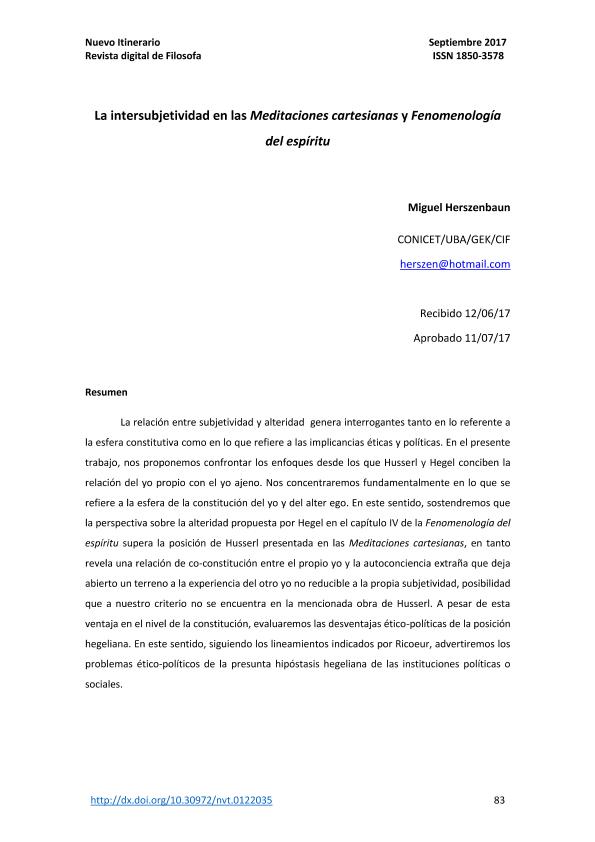Artículo
La relación entre subjetividad y alteridad genera interrogantes tanto en lo referente a la esfera constitutiva como en lo que refiere a las implicancias éticas y políticas. En el presente trabajo, nos proponemos confrontar los enfoques desde los que Husserl y Hegel conciben la relación del yo propio con el yo ajeno. Nos concentraremos fundamentalmente en lo que se refiere a la esfera de la constitución del yo y del alter ego. En este sentido, sostendremos que la perspectiva sobre la alteridad propuesta por Hegel en el capítulo IV de la Fenomenología del espíritu supera la posición de Husserl presentada en las Meditaciones cartesianas, en tanto revela una relación de co-constitución entre el propio yo y la autoconciencia extraña que deja abierto un terreno a la experiencia del otro yo no reducible a la propia subjetividad, posibilidad que a nuestro criterio no se encuentra en la mencionada obra de Husserl. A pesar de esta ventaja en el nivel de la constitución, evaluaremos las desventajas ético-políticas de la posición hegeliana. En este sentido, siguiendo los lineamientos indicados por Ricoeur, advertiremos los problemas ético-políticos de la presunta hipóstasis hegeliana de las instituciones políticas o sociales. The relationship between subjectivity and alterity raises questions referring both to their constitution and their ethical and political consequences. In the following paper, I intend to consider how Husserl and Hegel conceive the relation between the self and the alter ego. In this regard, I will focus mainly in the constitution of the self and the alter ego. I will claim that Hegel’s conception of the alterity in chapter IV of the Phenomenology of the Spirit provides a better stand-point from which conceiving the alter ego than Husserl’s position presented in Cartesian Meditations. This is due to that Hegel’s Phenomenology reveals a relation of coconstitution between the self and the other’s self-consciousness that allows a deeper experience of the other that is not reducible to our self-subjectivity. I state that this latter possibility is not presented in Husserl’s Cartesian Meditations. Although Hegel’s conception of the self has an advantage regarding its constitution, it is necessary to consider its ethical and political disadvantages. In this respect, I will consider Ricoeur’s guidelines.
La intersubjetividad en las meditaciones cartesianas y fenomenología del espíritu
Fecha de publicación:
09/2017
Editorial:
Universidad Nacional del Nordeste. Instituto de Filosofía
Revista:
Nuevo Itinerario
ISSN:
1850-3578
Idioma:
Español
Tipo de recurso:
Artículo publicado
Clasificación temática:
Resumen
Palabras clave:
Hegel
,
Husserl
,
Subjetividad
,
Intersubjetividad
Archivos asociados
Licencia
Identificadores
Colecciones
Articulos(SEDE CENTRAL)
Articulos de SEDE CENTRAL
Articulos de SEDE CENTRAL
Citación
Herszenbaun, Miguel Alejandro; La intersubjetividad en las meditaciones cartesianas y fenomenología del espíritu
; Universidad Nacional del Nordeste. Instituto de Filosofía; Nuevo Itinerario; 12; 9-2017; 83-108
Compartir
Altmétricas




